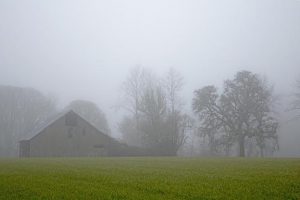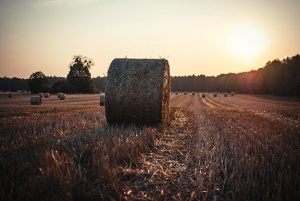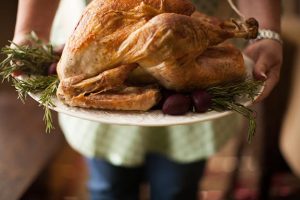 Perhaps the faces were not as colorful, the voices so resonant or the rooms as bright as they remain in my memory. For the past is not merely what actually happened or what really was—it is also what we remember and how our memory has shaped our understanding of what we are and how things should be. Even now as another Thanksgiving holiday draws near a score of memories, some half-remembered, half-forgotten pictures march across the screen of my mind. The faces of relatives who gather for the family dinner; a few brown leaves hang tenaciously from stark branches; here and there a leaf, which Mr. Weatherspoon’s omnivorous rake somehow missed, dot his otherwise immaculate yard; and the ubiquitous fog—always it is foggy on Thanksgiving Day where I grew up.
Perhaps the faces were not as colorful, the voices so resonant or the rooms as bright as they remain in my memory. For the past is not merely what actually happened or what really was—it is also what we remember and how our memory has shaped our understanding of what we are and how things should be. Even now as another Thanksgiving holiday draws near a score of memories, some half-remembered, half-forgotten pictures march across the screen of my mind. The faces of relatives who gather for the family dinner; a few brown leaves hang tenaciously from stark branches; here and there a leaf, which Mr. Weatherspoon’s omnivorous rake somehow missed, dot his otherwise immaculate yard; and the ubiquitous fog—always it is foggy on Thanksgiving Day where I grew up.
 There are sounds and smells and feelings as well that mingle with the nutmeg and cinnamon of baking pumpkin pies. The sound of the crackling fire in the fireplace and the scent of wood smoke in the cold misty air. My cousin, Johnny and I, rushing, huffing and puffing through the kitchen, grabbing handfuls of food, winded from climbing on the foggy bluffs near my childhood home or on Uncle Bill’s hay bales stacked high as the sky. My mother and Aunt Marion chasing us out the door, past Uncle Charlie and my father playing chess in a cloud of cigar and cigarette smoke, and Auntie Ethel laughing. My sister, Pam and cousin, Carol, huddled, talking as older girls do.
There are sounds and smells and feelings as well that mingle with the nutmeg and cinnamon of baking pumpkin pies. The sound of the crackling fire in the fireplace and the scent of wood smoke in the cold misty air. My cousin, Johnny and I, rushing, huffing and puffing through the kitchen, grabbing handfuls of food, winded from climbing on the foggy bluffs near my childhood home or on Uncle Bill’s hay bales stacked high as the sky. My mother and Aunt Marion chasing us out the door, past Uncle Charlie and my father playing chess in a cloud of cigar and cigarette smoke, and Auntie Ethel laughing. My sister, Pam and cousin, Carol, huddled, talking as older girls do.
 Then, of course, there is the table stretching on forever—spread with a basted Turkey (or was it ham?) mashed potatoes & gravy, candied yams, cranberry sauce, peas and green beans and yellow corn, and the childish joy of black olives on my five fingers. Maybe, best of all, is the nostalgia of lingering long around the dinner table after the great meal to hear the adults talk politics, the war (which of course was WWII), and, especially, the mountains and pack trips—fish caught, deer shot, trails missed—as names like Salmon Falls, Brush Creek, South Fork—took on mythic dimensions in my young mind.
Then, of course, there is the table stretching on forever—spread with a basted Turkey (or was it ham?) mashed potatoes & gravy, candied yams, cranberry sauce, peas and green beans and yellow corn, and the childish joy of black olives on my five fingers. Maybe, best of all, is the nostalgia of lingering long around the dinner table after the great meal to hear the adults talk politics, the war (which of course was WWII), and, especially, the mountains and pack trips—fish caught, deer shot, trails missed—as names like Salmon Falls, Brush Creek, South Fork—took on mythic dimensions in my young mind.
The Christian sociologist, Anthony Campolo notes, “Rituals and traditions have held America together. Families need traditions of Bible Study, holiday dinners, Sundays together. Establish these things,” he says, “give your kids something to hold onto.” Yet it is not only kids who need these—we all do. They are important because faith and belief are shaped as much by images, moods and memories as they are by thoughts, ideas, and precepts. An Altar Guild gets it right when they adorn the foot of the Altar or festoon our sanctuaries with pumpkins, gourds, and cornucopias—symbols of God’s goodness and bounty. As in Psalm 65, a Hebrew harvest hymn often appointed for the Thanksgiving Eucharist, where the psalmist paints God’s wonderful provision with word pictures. He makes us feel the splash of rain showers on the dry earth. When in verse 11, he writes, “You crown the year with your bounty/your wagon tracks overflow with abundance.” We can see the farm wagons hauled from the fields, the grain heaped so high it pours over the sides filling the freshly made wheel ruts as the wagon trundles toward the threshing floor, the path marked by surplus for the poor.
I believe Eugene Peterson’s translation of these verses deserve a joyous reading on Thanksgiving Day:
Oh, visit the earth, /ask her to join the dance!
Deck her out in spring showers, /fill the God-River with living water.
Paint the wheat fields golden. / Creation was made for this!
Drench the plowed fields, / soak the dirt clods
With rainfall as harrow and rake/ bring her to blossom and fruit.
Snow-crown the peaks with splendor, /scatter rose petals down your path,
All through the wild meadows, rose petals. / Set the hills to dancing,
Dress the canyon walls with live sheep, / a drape of flax across the valleys,
Let them shout, and shout, and shout! / Oh, oh, let them sing! (Ps. 65:9-13)
Here is a man gripped by God’s goodness and trustworthiness. Like Jesus, who spoke often of his Father’s goodness, and taught us to take a good look at the birds of the air and the little flowers in the fields, God’s goodness for this psalmist spills over into a life of gratitude. Fleming Rutledge puts it well, “The giving of thanks is not just an activity to be taken up at certain times and set aside at other times. It is a whole way of life.” One might even say it is The Normal Christian Life. Nevertheless, to set aside days when a people offer their Creator thanks is formational. From early on in our nation’s history it has been so. Our ancestors knew and practiced this even in days of scarcity. They learned it from the Holy Scriptures—both Testaments.
The Creator, who has filled the world with so much wonder and mystery, beauty and truth is—as Jesus revealed—our heavenly Father. He is no gloomy tyrant from whose grimy, stingy hands we have to wrench every meager gift. Yet, make the gifts of God our highest priority and moth will eat, rust will mar, thief will steal, and worry will whittle away. “But seek first the Kingdom of God and his righteousness… and all these things…” the world’s, wonder, mystery, beauty and truth, as well as life’s gifts will be added to us in due time and right order. We don’t have to worry about missing out. There is enough—always has been enough—enough and to spare.
For the Christian, however, there is even more to this life of thanksgiving than gratitude for God’s abundant gifts. There is his wonderful forgiveness through Jesus Christ. Returning to Peterson’s translation of Psalm 65 the psalmist declares, ‘We all arrive at your doorstep sooner or later loaded with guilt. Our sins too much for us—but you get rid of them once and for all. Blessed are the chosen! Blessed are the guests at home in your place! …Dawn and dusk take turns calling, “Come and worship.”’ This too by grace I know and remember.
It was on Thanksgiving in 1971. I came home from college for the holiday. A seeker still at twenty-one. After the meal; after the blessings; yes, and after the family dysfunction and pain; I went for a long walk in the “foggy night”, knelt down and prayed and began to learn what it means to be forgiven, to be chosen and brought near, a guest at home in his house through his Son Jesus Christ. Since then, for me at least, it has been a day to remember; a day of feasting with family and friends and fellow sojourners; a day to give thanks; and for a moment to be quiet enough to hear the dawn and dusk take turns calling, “Come and Worship.” Or perhaps even to sing that old English hymn, “Come, ye faithful people, come, raise the song of harvest home.”


Pingback: Bishop Mark Lawrence: Thanksgiving—the Normal Christian Life | TitusOneNine
Pingback: Bishop Mark Lawrence: Thanksgiving—the Normal Christian Life | TitusOneNine
Pingback: Bishop Mark Lawrence: Thanksgiving—the Normal Christian Life | TitusOneNine
Thanks, Joy, and I’m grateful for your article. Happy Thanksgiving!